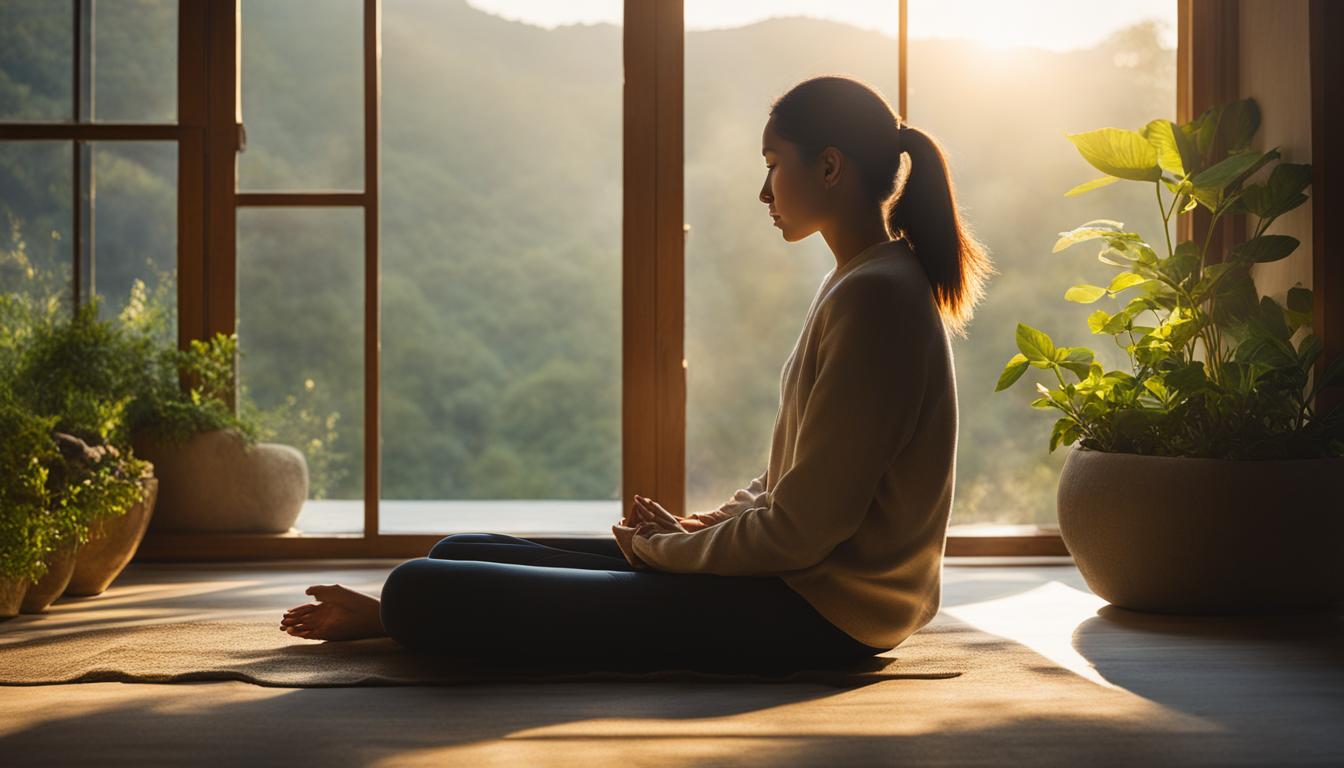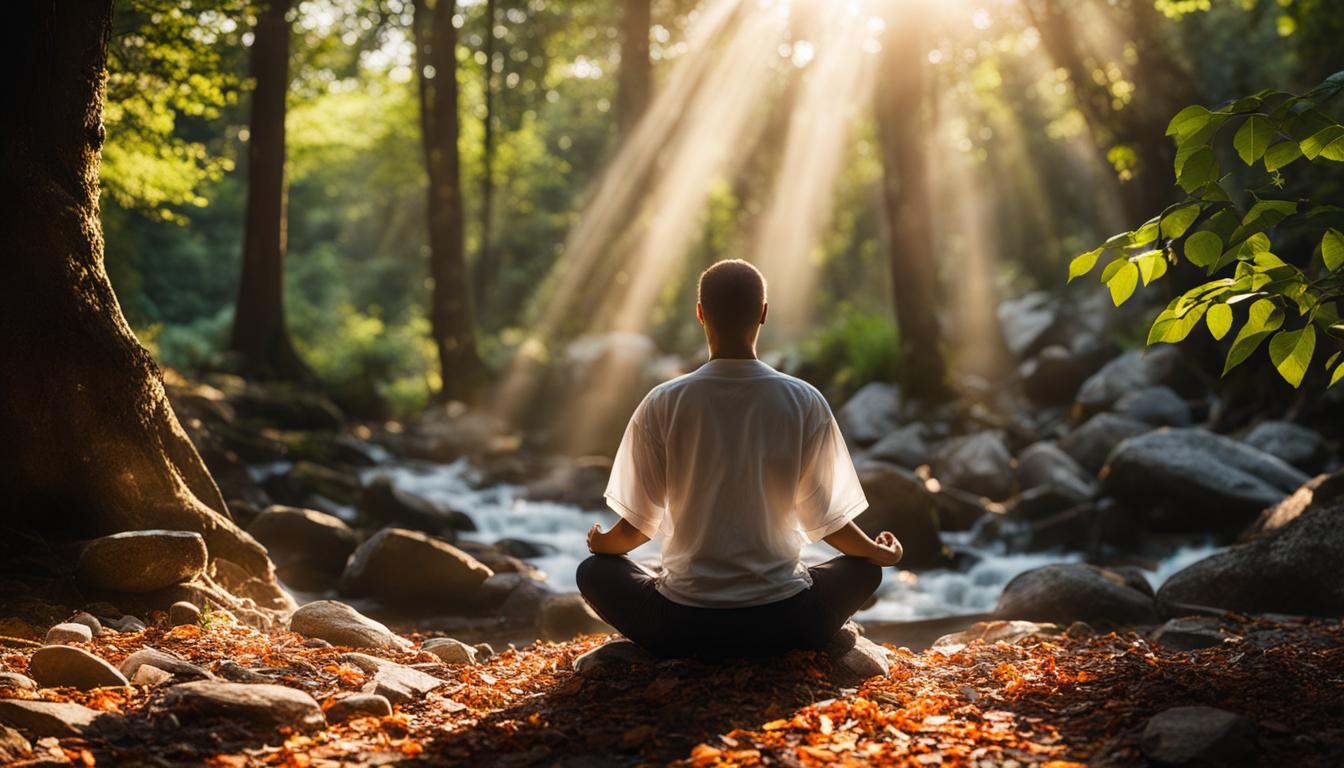Welcome to the beginner’s guide to mindfulness! In today’s fast-paced world, it’s easy to get caught up in the hustle and bustle of everyday life. But what if there was a way to find peace and calm amidst the chaos? That’s where mindfulness comes in.
Mindfulness is the practice of being fully present and aware of our thoughts and feelings, without judgment. It allows us to cultivate a sense of peace and clarity, even in the midst of stress and uncertainty. And the best part? It’s accessible to everyone, regardless of age or experience.
Whether you’re new to mindfulness or looking to deepen your practice, this guide is here to help. We’ll explore the basics of mindfulness, the benefits it brings to our lives, and practical techniques you can start using today.
So, if you’re ready to embark on a journey of self-discovery and inner peace, let’s dive into the world of mindfulness for beginners!
Key Takeaways:
- Mindfulness is the practice of being fully present and aware of our thoughts and feelings without judgment.
- It offers numerous benefits, including stress reduction, improved focus, increased patience, and better connections with others.
- Mindfulness can be practiced through meditation, mindful movement, and incorporating it into daily activities.
- Finding the right mindfulness style for you and overcoming common challenges are important aspects of the journey.
- Mindfulness has scientifically proven positive effects on mental well-being, including changes in brain structure and reduced stress levels.
The Basics of Mindfulness
Mindfulness is the natural ability to be aware of our present moment and not be overwhelmed by external distractions. It involves bringing attention to our senses and thoughts, and it can be practiced through various techniques such as meditation and body scans.
Starting mindfulness may seem daunting, but it is a simple process that anyone can learn. By focusing on the here and now, we can cultivate a deeper sense of self-awareness and appreciation for the present moment. Mindfulness is not about emptying the mind or stopping our thoughts; it’s about observing them without judgment.
One effective technique for starting mindfulness is meditation. Find a quiet and comfortable space, sit in a relaxed posture, and close your eyes. Focus on your breath, the sensations in your body, or a specific object. When your mind wanders (which it will), gently bring your attention back to the chosen anchor. Regular practice can strengthen your mindfulness muscle and increase your ability to stay present in everyday life.

The Power of Mindful Awareness
As renowned mindfulness expert Jon Kabat-Zinn said, “Mindfulness means paying attention in a particular way; on purpose, in the present moment, and nonjudgmentally.” By cultivating mindful awareness, we gain the ability to respond rather than react to life’s challenges. This state of nonjudgmental awareness can lead to increased emotional resilience, reduced stress levels, and improved overall well-being.
“The present moment is the only time over which we have dominion.” – Thich Nhat Hanh
The Art of Being Present
Being present is a powerful gift we can give ourselves. It allows us to fully engage with our experiences, relationships, and surroundings. Mindfulness helps us break free from automatic pilot mode and bring our attention back to the richness of the present moment. Through mindfulness, we can let go of regrets about the past or worries about the future and truly experience the beauty of the here and now.
The Benefits of Mindfulness
Mindfulness practices offer a wide range of benefits for beginners seeking to incorporate mindfulness into their lives. Here are some key advantages:
- Stress reduction: Mindfulness exercises can help lower stress levels by promoting relaxation and calming the mind. By focusing on the present moment and accepting it without judgment, individuals can experience a greater sense of ease and tranquility.
- Improved focus: Practicing mindfulness can sharpen our ability to concentrate and pay attention. By training our minds to stay present, we can enhance our focus in various areas of life, such as work, study, or daily tasks.
- Increased patience: Mindfulness encourages us to develop patience and tolerance towards ourselves and others. By cultivating a non-judgmental attitude, we can become more understanding and compassionate, leading to better relationships and interactions.
- Better connections with others: Mindfulness practices can help us deepen our connections with friends, family, and colleagues. By being fully present in conversations and truly listening to others, we can foster stronger bonds and build more meaningful relationships.
- Enhanced empathy: Mindfulness can cultivate empathy and compassion towards ourselves and others. By developing a greater understanding of our own thoughts and emotions, we can better relate to the experiences of those around us, fostering empathy and kindness.
- Identifying and transforming negative patterns: Mindfulness allows us to observe and become aware of negative patterns of behavior or thought. By noticing these patterns, we can be proactive in transforming them and creating healthier habits and ways of thinking.
To experience these benefits, beginners can explore various mindfulness exercises and techniques, such as meditation, breathing exercises, or body scans. It’s important to find practices that resonate with your preferences and lifestyle. Remember, mindfulness is a journey, so be patient with yourself and enjoy the process of self-discovery and growth.

Mindfulness Meditation for Beginners
Mindfulness meditation is a powerful technique for beginners looking to cultivate mindfulness in their lives. This practice involves finding a quiet and comfortable space, closing your eyes, and bringing your attention to the present moment. One simple technique is to focus on your breath, observing the sensation of each inhale and exhale. When your mind inevitably starts to wander, gently guide your attention back to your breath. With regular practice, you can develop a calmer and more focused mind.
An important aspect of mindfulness meditation is the non-judgmental acceptance of your thoughts and feelings. As you observe your thoughts during meditation, avoid labeling them as good or bad. Instead, simply acknowledge them and let them go. This practice teaches you to be more compassionate towards yourself and to cultivate a sense of presence and awareness in your daily life.
There are many easy mindfulness techniques that can be incorporated into your meditation practice. Body scanning involves bringing your attention to different parts of your body, starting from your toes and slowly working your way up to your head. This helps you tune into any physical sensations or tension in your body, promoting relaxation and grounding.
Benefits of Mindfulness Meditation
- Reduces stress and anxiety
- Improves focus and concentration
- Promotes emotional well-being
- Enhances self-awareness
- Cultivates a sense of inner peace and calm
Practicing mindfulness meditation allows you to take a step back from the constant stream of thoughts and distractions, giving you the opportunity to reconnect with yourself and find a sense of balance in the midst of a busy world.
Remember, mindfulness meditation is a practice, and like any new skill, it takes time and effort to develop. Start with just a few minutes each day and gradually increase the duration as you become more comfortable. With consistent practice, you’ll begin to notice the positive impact that mindfulness meditation has on your overall well-being.

Mindful Movement for Beginners
Incorporating mindful movement into your mindfulness practice can be a great way to deepen your awareness and cultivate a sense of presence. Whether it’s through yoga, walking meditation, or other physical activities, mindful movement allows us to bring our attention to the sensations and movements of our body, promoting a greater connection between mind and body.
One easy mindfulness technique you can try is yoga. The gentle stretching and intentional movements in yoga help to ground you in the present moment and increase body awareness. As you move through different poses, pay attention to the sensations in your body, the feeling of your breath, and any thoughts or emotions that arise. This allows you to fully immerse yourself in the practice and cultivate a sense of mindfulness.
Walking meditation is another simple mindfulness practice that can be incorporated into your daily routine. Find a quiet and peaceful place to take a walk, and as you walk, bring your attention to the physical sensations of each step. Notice the feeling of your feet making contact with the ground, the movement of your body, and the sounds and sights around you. This practice helps to anchor you in the present moment and can be particularly beneficial for those who find sitting meditation challenging.
By engaging in mindful movement, you not only enhance your mindfulness practice but also experience the physical and mental benefits of movement itself. It can help to reduce stress, improve flexibility and strength, and promote overall well-being. So whether you choose to practice yoga, walking meditation, or any other mindful movement activity, remember to approach it with a sense of curiosity and openness, allowing yourself to fully experience the present moment.

Benefits of Mindful Movement:
- Increased body awareness
- Improved flexibility and strength
- Reduced stress and anxiety
- Promotes overall well-being
“Mindful movement allows us to bring our attention to the sensations and movements of our body, promoting a greater connection between mind and body.”
Incorporating Mindfulness into Daily Life
Mindfulness is not just a practice to be reserved for meditation sessions or yoga classes. It can be integrated into our daily lives, enriching our experiences and bringing a sense of presence and intention to everything we do. Here are some tips for starting mindfulness and incorporating it into your everyday activities:
1. Mindful Eating:
When you sit down for a meal, take a moment to appreciate the food in front of you. Notice the colors, textures, and aromas. Chew slowly and savor each bite, paying attention to the flavors and sensations in your mouth. Be fully present with your meal, free from distractions, and allow yourself to enjoy the nourishment it provides.
2. Active Listening:
When engaging in conversation with others, practice active listening. Give your full attention to the person speaking, without interrupting or planning your response. Be present with their words, body language, and emotions. This not only shows respect but also allows for a deeper connection and understanding.
3. Mindful Daily Tasks:
Whether it’s brushing your teeth, doing the dishes, or taking a shower, bring mindfulness to these everyday tasks. Notice the sensations, sounds, and movements involved. Instead of rushing through them mindlessly, view them as opportunities for mindfulness practice. Focus on the present moment and fully engage your senses.
By incorporating mindfulness into these and other daily activities, we can cultivate a greater sense of awareness, presence, and gratitude. Remember, mindfulness is a journey, and it takes time and practice to develop. Start with small steps and gradually expand your mindfulness practice into all aspects of your life.

Finding the Right Mindfulness Style for You
When it comes to practicing mindfulness, there are various styles and techniques to choose from. It’s important to explore different options to find the one that resonates with you the most and fits into your lifestyle. Here are some popular mindfulness styles to consider:
Meditation
Meditation is one of the most common mindfulness practices. It involves sitting quietly and focusing your attention on your breath, a mantra, or a specific object. Meditation can help you cultivate a calm and clear mind, reduce stress, and improve emotional well-being.
“Meditation is a powerful tool for self-discovery and inner peace. It allows us to observe our thoughts and emotions without judgment, helping us create space for deeper self-awareness and insight.”
Yoga
Yoga combines physical postures, breathing exercises, and meditation to promote mindfulness and relaxation. It can help improve flexibility, strength, and balance, while also cultivating a sense of presence and mindfulness. You can start with beginner-friendly yoga classes or follow guided videos online to get started.
Journaling
Journaling is a mindfulness practice that involves writing down your thoughts, feelings, and experiences. It can help you gain clarity, process emotions, and reflect on your daily life. You can start by setting aside a few minutes each day to write freely or use prompts to guide your journaling practice.
Remember, finding the right mindfulness style is a personal journey. You may want to try different techniques and see what resonates with you the most. The key is to choose a practice that you enjoy and can easily incorporate into your daily routine. Whether it’s meditation, yoga, journaling, or guided programs, exploring different mindfulness styles can help you deepen your practice and experience the benefits of mindfulness in your life.
Mindfulness Challenges and Tips for Beginners
Starting a mindfulness practice can come with its fair share of challenges, especially for beginners. It’s essential to recognize and overcome these hurdles to fully embrace the benefits of mindfulness. Here are some common challenges you may encounter and some practical tips to navigate them:
1. Restless Mind
One of the most common challenges in mindfulness practice is dealing with a restless mind. It’s natural for thoughts to arise and distract you during meditation or while trying to be present. Instead of getting frustrated, acknowledge the thoughts without judgment and gently guide your attention back to your breath or chosen anchor point. With time and practice, you’ll develop a greater ability to remain focused and calm.
2. Finding Time
Many beginners struggle to find time for mindfulness in their busy schedules. Start by setting aside just a few minutes each day dedicated to your practice. It can be as simple as waking up a few minutes earlier or incorporating mindfulness into everyday activities like walking or eating. Consistency is key, so find what works best for you and make it a priority.
3. Patience and Expectations
When embarking on a mindfulness journey, it’s important to approach it with patience and realistic expectations. Mindfulness is a skill that develops over time, and it’s normal to encounter ups and downs along the way. Allow yourself to be a beginner and embrace the learning process without judgment or self-criticism. Celebrate the small victories and trust that you’re making progress, even if it’s not always immediately noticeable.
Remember, everyone’s mindfulness journey is unique, and what works for one person may not work for another. It’s essential to explore different techniques, styles, and teachers to find what resonates with you. Be open-minded and flexible as you navigate through the challenges, and above all, be kind and compassionate towards yourself.

The Impact of Mindfulness on Well-being
Mindfulness practices for beginners can have a profound impact on overall well-being. Scientific research has shown that regular mindfulness practice can lead to positive changes in the brain structure. By cultivating mindfulness, individuals can experience reduced stress levels, improved focus, and a greater sense of overall well-being.
Studies have demonstrated that mindfulness activates areas of the brain associated with emotional regulation and attention control. This can lead to decreased activity in the amygdala, the part of the brain responsible for processing fear and stress responses. As a result, individuals who practice mindfulness may experience reduced anxiety and a greater ability to manage stress.
“Mindfulness is not about getting rid of stress or fixing ourselves. It’s about embracing the present moment with acceptance and compassion.”
In addition to its impact on the brain, starting mindfulness practices can also have significant benefits for mental health. Mindfulness has been shown to enhance self-awareness, improve emotional regulation, and increase resilience. It can help individuals become more attuned to their thoughts and emotions, allowing them to respond to challenging situations with greater clarity and composure.
Mindfulness for beginners can be a powerful tool for improving overall well-being. By incorporating simple practices into daily life, individuals can experience reduced stress, improved focus, and a greater sense of presence and compassion.

- Regular mindfulness practice can lead to positive changes in the brain structure.
- Mindfulness activates areas of the brain associated with emotional regulation and attention control.
- Starting mindfulness practices can have significant benefits for mental health, enhancing self-awareness and emotional regulation.
Mindfulness for Stress Reduction
Stress has become an increasingly prevalent issue in today’s fast-paced world, impacting both our physical and mental well-being. Fortunately, mindfulness offers a powerful solution for stress reduction. By incorporating mindfulness practices into our daily lives, we can cultivate a greater sense of awareness and learn to respond to stressors in a more calm and balanced way.
Studies have shown that mindfulness exercises can effectively reduce stress levels. One study found that individuals who practiced mindfulness techniques experienced a significant decrease in stress-related symptoms, such as anxiety and depression. Mindfulness allows us to shift our focus away from the worries and pressures of the future or past and anchor ourselves in the present moment. By doing so, we can break free from the cycle of stress and find a sense of inner peace and calm.
One effective mindfulness practice for stress reduction is mindful breathing. Taking a few moments throughout the day to focus on our breath can help us center ourselves and alleviate stress. Close your eyes, take a deep breath in through your nose, and slowly exhale through your mouth. As you breathe, observe the sensations of your breath entering and leaving your body. This simple practice can help slow down our racing thoughts and bring us back to the present moment.

In addition to mindful breathing, incorporating other mindfulness exercises, such as body scans or mindful walking, can further enhance stress reduction. Engaging in these practices allows us to reconnect with our bodies and release tension. By paying attention to the sensations in our bodies or the movements of our feet as we walk, we can shift our focus away from stress and find a sense of grounding.
By making mindfulness a regular part of our routine, we can develop resilience and better manage stress. Mindfulness for stress reduction is a journey that takes time and practice, so be patient with yourself. With consistent effort, you can experience the transformative benefits of mindfulness and regain a sense of balance and well-being in your life.
Mindfulness Tips for Beginners
Starting a mindfulness practice can feel overwhelming for beginners. However, with the right tips and guidance, anyone can embark on a successful mindfulness journey. Here are some beginner mindfulness tips to help you get started:
- Start small: Begin by dedicating just a few minutes each day to mindfulness practice. Gradually increase the duration as you become more comfortable.
- Set a routine: Establish a regular time and place for your mindfulness practice. Consistency is key in building a habit.
- Focus on the present moment: Mindfulness is about being fully present in the here and now. Bring your attention to your senses, thoughts, and emotions without judgment.
- Experiment with different techniques: There are various mindfulness techniques to explore, such as meditation, body scans, or mindful movement. Find the ones that resonate with you the most.
Remember, mindfulness is a skill that develops over time. Be patient with yourself and approach it with curiosity and openness. As you continue your practice, you’ll discover its transformative effects on your well-being.
Quotes:
“Mindfulness is the key to unlock the fullness of life. It allows us to appreciate the present moment and live with greater awareness and compassion.” – Anonymous
“By practicing mindfulness, we can cultivate a deeper connection with ourselves and the world around us. It’s a journey of self-discovery and inner peace.” – Anonymous
With these beginner mindfulness tips, you can begin your journey towards greater presence and well-being. Start with small, achievable goals, and gradually expand your practice. Embrace the process, and enjoy the transformative power of mindfulness.
Conclusion
Mindfulness is a powerful practice that can transform our lives. Whether you’re a beginner or looking to deepen your mindfulness journey, incorporating simple steps into your daily routine can have profound effects on your well-being. By being fully present and aware of your thoughts and feelings without judgment, you can cultivate a greater sense of clarity and peace.
Starting your mindfulness journey is easier than you think. A beginner’s guide to mindfulness can help you learn the basics and discover easy mindfulness techniques that resonate with you. From mindfulness meditation to mindful movement like yoga or walking meditation, there are various practices to explore and incorporate into your daily life.
Remember, mindfulness is not about perfection. It’s about progress and being kind to yourself along the way. By setting small, achievable goals and building consistency over time, you can experience the benefits of mindfulness for beginners. Reduced stress levels, improved focus, and a greater sense of presence and compassion are waiting for you on this journey.
So why wait? Start your mindfulness journey today and embrace the power of mindfulness for beginners. Take a moment each day to be fully present and discover the incredible impact it can have on your overall well-being. Easy mindfulness techniques are just a breath away!
FAQ
What is mindfulness?
Mindfulness is the ability to be fully present and aware of our thoughts and feelings without judgment.
How can I cultivate mindfulness?
Mindfulness can be cultivated through daily exercises such as meditation and body scans.
What are the benefits of mindfulness?
Mindfulness offers numerous benefits, including stress reduction, improved focus, increased patience, better connections with others, and enhanced empathy.
What is mindfulness meditation?
Mindfulness meditation is a practice where you focus on the breath or body sensations and gently return to the present moment whenever the mind wanders.
How can I cultivate mindfulness through movement?
Mindful movement, such as yoga or walking meditation, can be a great way to cultivate mindfulness for beginners.
How can mindfulness be integrated into everyday activities?
Mindfulness can be practiced in everyday activities such as eating, listening to others, and engaging in daily tasks.
What are some different mindfulness styles?
There are various mindfulness styles, such as meditation, yoga, journaling, and guided programs.
What are some challenges for beginners starting a mindfulness practice?
Beginning a mindfulness practice can come with challenges such as a busy mind or difficulties setting aside time.
What are the scientific benefits of mindfulness?
Scientific research has shown that mindfulness can have positive effects on our mental well-being, including changes in the brain structure, reduced stress levels, improved focus, and overall well-being.
How can mindfulness help with stress reduction?
Mindfulness is a powerful tool for stress reduction as it helps us cultivate awareness and respond rather than react to stressful situations.
How can beginners start practicing mindfulness?
Beginners can start by setting small, achievable goals, dedicating time for mindfulness practice, finding a mentor or teacher, and exploring different techniques.
What are the benefits of incorporating mindfulness into daily life?
By incorporating mindfulness into daily life, we can enhance our well-being, reduce stress, and cultivate a greater sense of presence and compassion.


